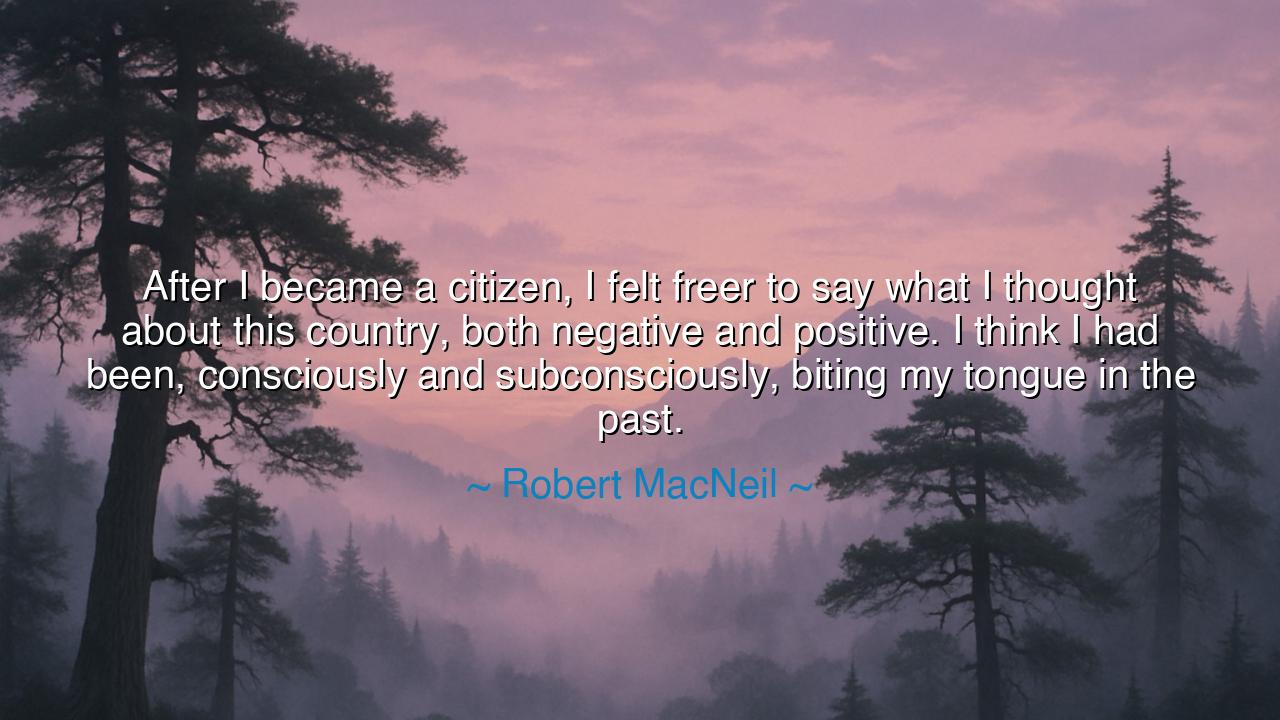
After I became a citizen, I felt freer to say what I thought
After I became a citizen, I felt freer to say what I thought about this country, both negative and positive. I think I had been, consciously and subconsciously, biting my tongue in the past.






Hear now the words of Robert MacNeil, who once declared: “After I became a citizen, I felt freer to say what I thought about this country, both negative and positive. I think I had been, consciously and subconsciously, biting my tongue in the past.” His utterance is not mere reflection, but the confession of a soul awakening to its rightful place among the people of a land. For citizenship is not only a legal formality—it is the binding of one’s spirit to the destiny of a nation, and with it comes the sacred right to speak truth without fear. To belong fully is to unshackle the tongue, and to find one’s words resonating with the authority of shared identity.
In these words lies the eternal tension between the outsider and the insider. When one dwells as a guest, even in a land of freedom, there is a whisper of restraint, a caution not to offend, a subtle silence that stifles honesty. But once the bond of citizenship is forged, the silence breaks; one may praise and one may rebuke, for the voice has earned its rightful standing. The chains of hesitation fall away, and the individual joins the chorus of a people shaping their collective future.
Consider the story of Frederick Douglass, born enslaved yet rising as one of the greatest orators for freedom. In his early years, though his spirit thundered within him, the chains of bondage forced him into silence. Only when he escaped into liberty could his voice pour forth unrestrained, both to honor the promise of America and to condemn its betrayal of that promise. His freedom of speech was not merely the gift of geography, but of identity—an assertion that he now belonged to the story of the nation. MacNeil’s insight echoes Douglass: belonging grants both courage and responsibility to speak truth.
The words also remind us that true loyalty is not blind adoration. To love one’s country is not to veil its flaws but to reveal them, as a physician names the disease in order to heal. When MacNeil speaks of both the negative and positive, he reveals the dual duty of every citizen: to praise where honor is due, and to criticize where correction is needed. The silence of the tongue may preserve comfort, but it cannot preserve justice. Only the spoken word, sharpened by courage, can cut through hypocrisy and call forth renewal.
Yet this freedom is not without cost. To speak openly is to risk disapproval, to invite confrontation, and to bear the weight of responsibility. Still, it is better to face the storm with truth than to sit quietly in the calm of false peace. For the ancients teach us that the tongue, once freed, is both sword and seed. As sword, it strikes at corruption and complacency; as seed, it plants hope, reform, and vision in the soil of a nation’s soul. Silence may keep one safe, but words spoken with integrity make one truly free.
Thus, the lesson for us is clear: embrace the full weight of your belonging, wherever you are planted. Do not wait for permission to speak your truth, but when you are granted the right, wield it with wisdom. Praise what uplifts, rebuke what corrupts, and always let your words spring from love, not from bitterness. The citizen’s voice is not a privilege for idle chatter—it is a sacred trust, a gift to be used for the shaping of tomorrow.
In your own life, then, practice this discipline. When you see goodness, speak it aloud; when you see injustice, name it boldly. In the household, in the workplace, in the public square, let your words be the voice of conscience. Do not bite your tongue out of fear, but speak with humility, courage, and clarity. For the silence of one heart may seem small, but the silence of many becomes the death of truth itself.
So remember MacNeil’s revelation, as if it were carved into stone for future generations: citizenship is not only a right to dwell, but a call to speak. To be silent when you may speak is to waste your freedom; to speak when you are free is to honor it. Let this wisdom guide you, and let your voice join the eternal chorus of those who dared to speak truth for the sake of their people.






AAdministratorAdministrator
Welcome, honored guests. Please leave a comment, we will respond soon